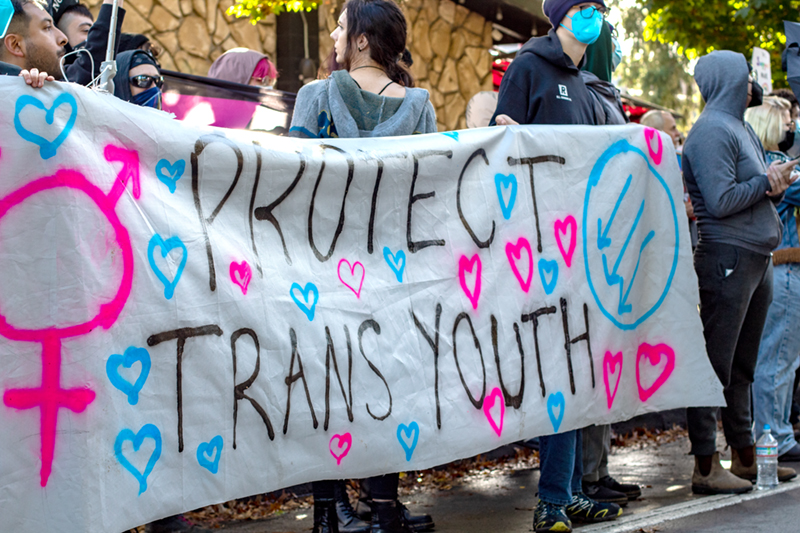Lia Thomas Loses Swim Titles as UPenn Caves to Federal Pressure
University agrees to strip transgender swimmer's records and ban trans athletes from women's sports to comply with Trump administration's interpretation of Title IX.

The University of Pennsylvania has agreed to retroactively strip Lia Thomas — a transgender woman and former UPenn swimmer — of her records and titles as part of a settlement with the U.S. Department of Education.
The Education Department had threatened to withhold $175 million in federal funds from the university as punishment for allowing Thomas to compete as a woman in 2022.
Since taking office, the department — complying with a Trump executive order stating that the United States only recognizes two sexes, based on biological characteristics at birth — has launched multiple inquiries into schools that have allegedly allowed transgender athletes to compete in female-designated sports.
The department argues that allowing transgender athletes to compete in women’s sports violates Title IX, the federal law barring sex-based discrimination in federally funded educational programs and activities.
Thomas originally swam for UPenn’s men’s team, but joined the women’s team in her senior year after transitioning. She complied with NCAA rules at the time, which required transgender athletes to undergo hormone therapy for at least one year before competing as women. She went on to break school and meet records, becoming the first transgender woman to win an NCAA swimming championship in the Division I women’s 500-yard freestyle.
She also placed fifth in the 200-yard freestyle — tying with Riley Gaines, who later channeled her fury over Thomas’ participation into becoming an anti-transgender activist — and finished eighth in the 100-yard freestyle.
As part of the settlement with the Trump administration, the university agreed to ban transgender athletes from competing in sports designated for female participants, and to strip Thomas — and any other trans athletes — of school records, titles, and honors, awarding them instead to cisgender female swimmers, reports Axios.
In a statement announcing the resolution, UPenn President J. Larry Jameson said the school had complied with NCAA eligibility rules and the Biden administration’s interpretation of Title IX, which applied to gender identity as well as biological sex, when it allowed Thomas to compete.
“Penn has always followed — and continues to follow — Title IX and the applicable policy of the NCAA regarding transgender athletes,” Jameson wrote, noting that the NCAA changed its rules in February 2025 to bar transgender athletes from female sports under pressure from the Trump administration.
Jameson noted that the university would update UPenn’s women’s swimming records.
“While Penn’s policies during the 2021-2022 swim season were in accordance with NCAA eligibility rules at the time, we acknowledge that some student-athletes were disadvantaged by these rules,” he wrote. “We recognize this and will apologize to those who experienced a competitive disadvantage or experienced anxiety because of the policies in effect at the time.”
Praising the settlement as a means of restoring funds that, if withheld, would have seriously impacted the school, Jameson said the university remains committed to inclusivity.
“Our commitment to ensuring a respectful and welcoming environment for all of our students is unwavering,” he wrote. “At the same time, we must comply with federal requirements, including executive orders, and NCAA eligibility rules, so our teams and student-athletes may engage in competitive intercollegiate sports.”
In its prepared statement reaffirming its compliance with Title IX, the university wrote that it would not “exclude female students from participation in, deny female students the benefits of, or subject female students to discrimination under, any athletics programs.”
The statement also clarified that female student-athletes would not be required to share locker rooms or restrooms with athletes not assigned female at birth, and that sex-segregation in sports and athletic facilities would be maintained “irrespective of current or future policies from sporting or scholastic governing bodies, such as the Ivy League or individual sporting bodies.”
UPenn still faces a lawsuit from three former female swimmers who claim they were “emotionally traumatized” by having to compete with — and share locker room facilities with — Thomas, according to Fox News.
The lawsuit claims UPenn officials violated their rights under Title IX and gaslit the athletes by making them feel their concerns about being teammates with Thomas stemmed from a “psychological problem.” The former swimmers also allege they were led to believe they would be removed from the team if they protested or made public statements objecting to Thomas’ participation.
Support Metro Weekly’s Journalism
These are challenging times for news organizations. And yet it’s crucial we stay active and provide vital resources and information to both our local readers and the world. So won’t you please take a moment and consider supporting Metro Weekly with a membership? For as little as $5 a month, you can help ensure Metro Weekly magazine and MetroWeekly.com remain free, viable resources as we provide the best, most diverse, culturally-resonant LGBTQ coverage in both the D.C. region and around the world. Memberships come with exclusive perks and discounts, your own personal digital delivery of each week’s magazine (and an archive), access to our Member's Lounge when it launches this fall, and exclusive members-only items like Metro Weekly Membership Mugs and Tote Bags! Check out all our membership levels here and please join us today!





























You must be logged in to post a comment.